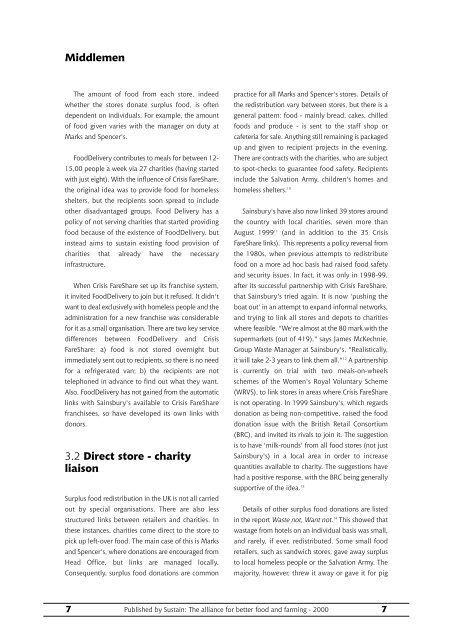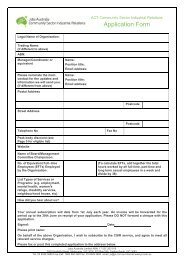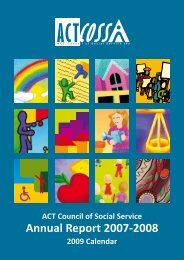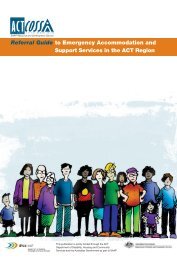Too much and too little? Debates on surplus food redistribution
Too much and too little? Debates on surplus food redistribution
Too much and too little? Debates on surplus food redistribution
You also want an ePaper? Increase the reach of your titles
YUMPU automatically turns print PDFs into web optimized ePapers that Google loves.
Middlemen<br />
The amount of <strong>food</strong> from each store, indeed<br />
whether the stores d<strong>on</strong>ate <strong>surplus</strong> <strong>food</strong>, is often<br />
dependent <strong>on</strong> individuals. For example, the amount<br />
of <strong>food</strong> given varies with the manager <strong>on</strong> duty at<br />
Marks <str<strong>on</strong>g>and</str<strong>on</strong>g> Spencer's.<br />
FoodDelivery c<strong>on</strong>tributes to meals for between 12-<br />
15,00 people a week via 27 charities (having started<br />
with just eight). With the influence of Crisis FareShare,<br />
the original idea was to provide <strong>food</strong> for homeless<br />
shelters, but the recipients so<strong>on</strong> spread to include<br />
other disadvantaged groups. Food Delivery has a<br />
policy of not serving charities that started providing<br />
<strong>food</strong> because of the existence of FoodDelivery, but<br />
instead aims to sustain existing <strong>food</strong> provisi<strong>on</strong> of<br />
charities that already have the necessary<br />
infrastructure.<br />
When Crisis FareShare set up its franchise system,<br />
it invited FoodDelivery to join but it refused. It didn't<br />
want to deal exclusively with homeless people <str<strong>on</strong>g>and</str<strong>on</strong>g> the<br />
administrati<strong>on</strong> for a new franchise was c<strong>on</strong>siderable<br />
for it as a small organisati<strong>on</strong>. There are two key service<br />
differences between FoodDelivery <str<strong>on</strong>g>and</str<strong>on</strong>g> Crisis<br />
FareShare: a) <strong>food</strong> is not stored overnight but<br />
immediately sent out to recipients, so there is no need<br />
for a refrigerated van; b) the recipients are not<br />
teleph<strong>on</strong>ed in advance to find out what they want.<br />
Also, FoodDelivery has not gained from the automatic<br />
links with Sainsbury's available to Crisis FareShare<br />
franchisees, so have developed its own links with<br />
d<strong>on</strong>ors.<br />
3.2 Direct store - charity<br />
liais<strong>on</strong><br />
Surplus <strong>food</strong> redistributi<strong>on</strong> in the UK is not all carried<br />
out by special organisati<strong>on</strong>s. There are also less<br />
structured links between retailers <str<strong>on</strong>g>and</str<strong>on</strong>g> charities. In<br />
these instances, charities come direct to the store to<br />
pick up left-over <strong>food</strong>. The main case of this is Marks<br />
<str<strong>on</strong>g>and</str<strong>on</strong>g> Spencer's, where d<strong>on</strong>ati<strong>on</strong>s are encouraged from<br />
Head Office, but links are managed locally.<br />
C<strong>on</strong>sequently, <strong>surplus</strong> <strong>food</strong> d<strong>on</strong>ati<strong>on</strong>s are comm<strong>on</strong><br />
7<br />
practice for all Marks <str<strong>on</strong>g>and</str<strong>on</strong>g> Spencer's stores. Details of<br />
the redistributi<strong>on</strong> vary between stores, but there is a<br />
general pattern: <strong>food</strong> - mainly bread, cakes, chilled<br />
<strong>food</strong>s <str<strong>on</strong>g>and</str<strong>on</strong>g> produce - is sent to the staff shop or<br />
cafeteria for sale. Anything still remaining is packaged<br />
up <str<strong>on</strong>g>and</str<strong>on</strong>g> given to recipient projects in the evening.<br />
There are c<strong>on</strong>tracts with the charities, who are subject<br />
to spot-checks to guarantee <strong>food</strong> safety. Recipients<br />
include the Salvati<strong>on</strong> Army, children's homes <str<strong>on</strong>g>and</str<strong>on</strong>g><br />
homeless shelters. 10<br />
Sainsbury's have also now linked 39 stores around<br />
the country with local charities, seven more than<br />
August 199911 (<str<strong>on</strong>g>and</str<strong>on</strong>g> in additi<strong>on</strong> to the 35 Crisis<br />
FareShare links). This represents a policy reversal from<br />
the 1980s, when previous attempts to redistribute<br />
<strong>food</strong> <strong>on</strong> a more ad hoc basis had raised <strong>food</strong> safety<br />
<str<strong>on</strong>g>and</str<strong>on</strong>g> security issues. In fact, it was <strong>on</strong>ly in 1998-99,<br />
after its successful partnership with Crisis FareShare,<br />
that Sainsbury's tried again. It is now 'pushing the<br />
boat out' in an attempt to exp<str<strong>on</strong>g>and</str<strong>on</strong>g> informal networks,<br />
<str<strong>on</strong>g>and</str<strong>on</strong>g> trying to link all stores <str<strong>on</strong>g>and</str<strong>on</strong>g> depots to charities<br />
where feasible. "We're almost at the 80 mark with the<br />
supermarkets (out of 419)," says James McKechnie,<br />
Group Waste Manager at Sainsbury's. "Realistically,<br />
it will take 2-3 years to link them all." 12 A partnership<br />
is currently <strong>on</strong> trial with two meals-<strong>on</strong>-wheels<br />
schemes of the Women's Royal Voluntary Scheme<br />
(WRVS), to link stores in areas where Crisis FareShare<br />
is not operating. In 1999 Sainsbury's, which regards<br />
d<strong>on</strong>ati<strong>on</strong> as being n<strong>on</strong>-competitive, raised the <strong>food</strong><br />
d<strong>on</strong>ati<strong>on</strong> issue with the British Retail C<strong>on</strong>sortium<br />
(BRC), <str<strong>on</strong>g>and</str<strong>on</strong>g> invited its rivals to join it. The suggesti<strong>on</strong><br />
is to have 'milk-rounds' from all <strong>food</strong> stores (not just<br />
Sainsbury's) in a local area in order to increase<br />
quantities available to charity. The suggesti<strong>on</strong>s have<br />
had a positive resp<strong>on</strong>se, with the BRC being generally<br />
supportive of the idea. 13<br />
Details of other <strong>surplus</strong> <strong>food</strong> d<strong>on</strong>ati<strong>on</strong>s are listed<br />
in the report Waste not, Want not. 14 This showed that<br />
wastage from hotels <strong>on</strong> an individual basis was small,<br />
<str<strong>on</strong>g>and</str<strong>on</strong>g> rarely, if ever, redistributed. Some small <strong>food</strong><br />
retailers, such as s<str<strong>on</strong>g>and</str<strong>on</strong>g>wich stores, gave away <strong>surplus</strong><br />
to local homeless people or the Salvati<strong>on</strong> Army. The<br />
majority, however, threw it away or gave it for pig<br />
Published by Sustain: The alliance for better <strong>food</strong> <str<strong>on</strong>g>and</str<strong>on</strong>g> farming - 2000 7













